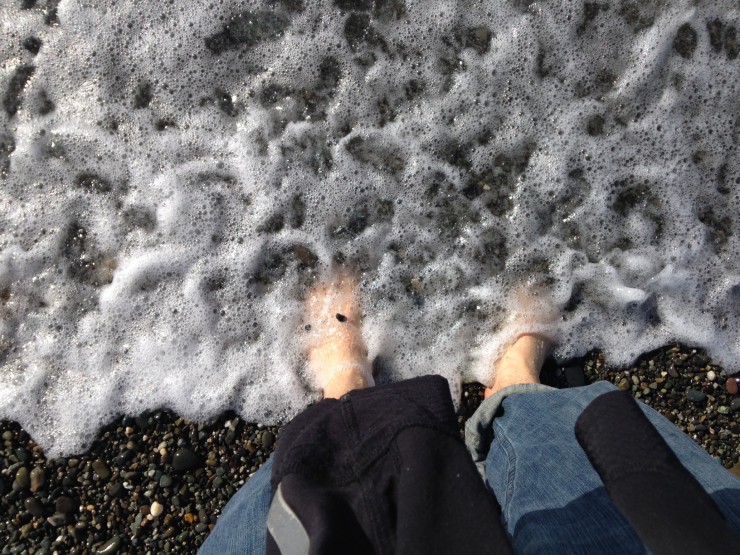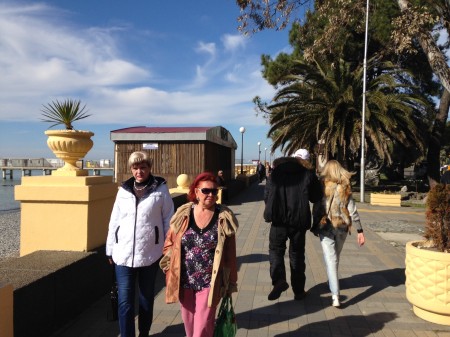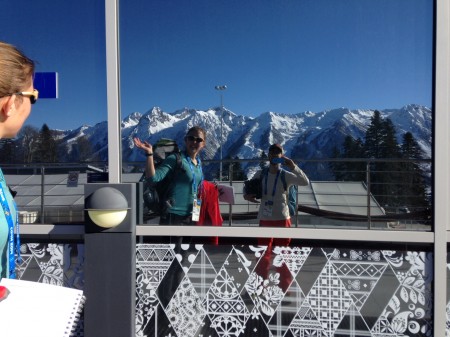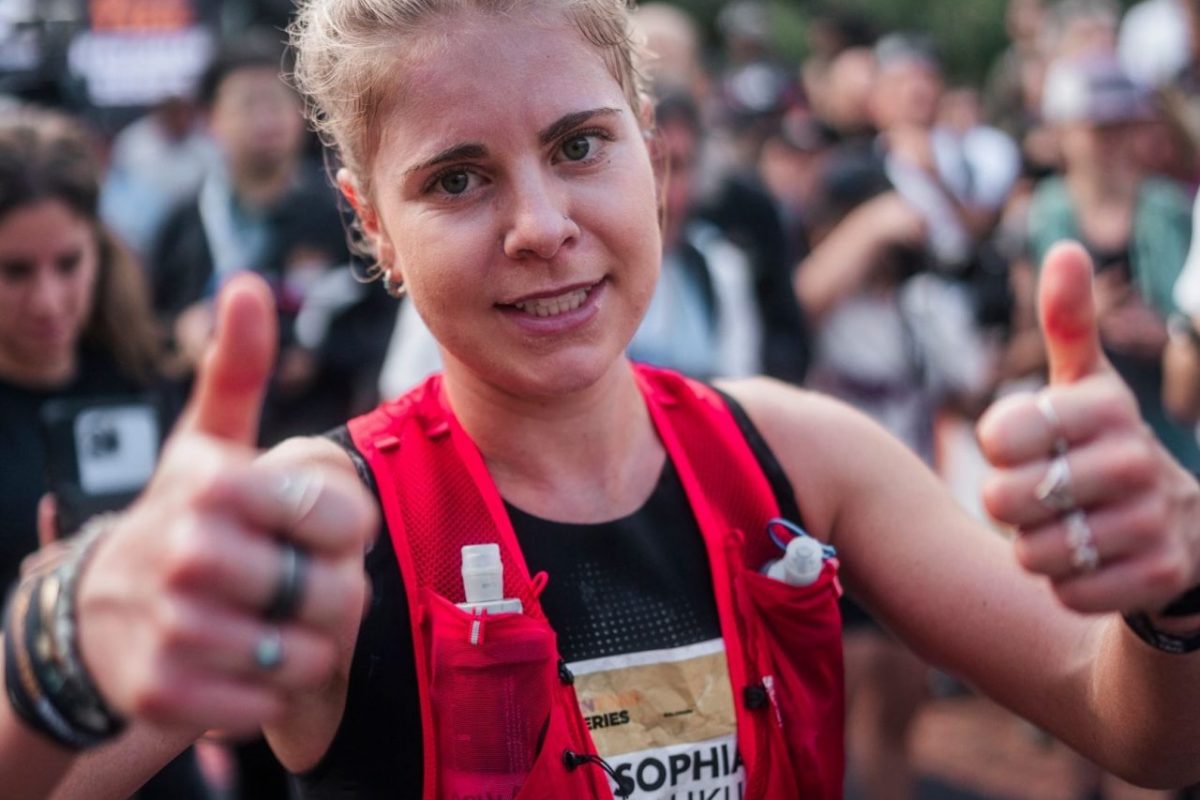
Okay, Vlad. I get it.
After five days of frantic work covering ski races in the mountains, I finally got to take a trip down the hill on your $8 billion railway. (Okay, the money paid for a road, too.)
At the bottom—in the Soviet seaside getaway of Adler—I expected more of the soulless, overpriced, overbuilt malls and hotels that your people had crammed into the Mzymta River valley, where I got onto the train.
Instead, I strolled off into an open-air market, where I bought a locally grown mandarin orange, a pickle, and a freshly baked chicken turnover before dipping my feet into the cool waters of the Black Sea.
It was 60 degrees.
Score a point for Putin.
Since arriving in the country last week, I’ve wanted to get out of the fantasyland that the Russians constructed in the Western Caucasus mountains, and down to the coast.
The area where I’m staying, Krasnaya Polyana—which is hosting all the skiing competitions during the Olympics—was developed almost entirely from scratch over the last several years in preparation for the games. As was widely reported, some of the construction wasn’t done in time.
By contrast, the seaside cities of Adler and Sochi already existed; Sochi was a resort getaway during the Soviet era.
Simply put, I thought a visit would help me better understand what this part of Russia was like—and in the process help me better understand what role the Olympics had here.

Getting from the mountains to the coast entailed a free, smooth, 40-minute ride on the train. (For the record, as I write this on the way back, we’re crawling along at 17 kilometers per hour.)
As we pulled into the Adler station—a suburb of Sochi—the Black Sea glittered off to the left. A women at an information desk directed me to a bus stop, where she told me to wait for number 124, which would take me to the city center. When it arrived, the “bus” turned out to amount to a large van, with a rickety automatic door that almost shoved me onto the floor when it closed.
The driver grouchily took my 100-ruble bill and gave me change while he shifted gears and made a tight merge onto a busy thoroughfare with, yes, palm trees planted in the median.
He dumped us out at a pullout next to what looked like a tired car dealership, which turned out to be a luxury mall. This was Adler.
I was skeptical as I wandered past some Western-looking shops, covered with logos for perfume, cameras, and iPads.
But my attitude started to change as I kept walking, and started to see things and people that seemed more authentic. (Bear with me if I’m stereotyping, which I probably am.)
There were stands with old, leathery men and women selling Russian flags and Olympic memorabilia; another group of men stood in sweatsuits smoking cigarettes, as two appeared to close a business deal with a handshake.
Then, I stumbled on the open-air market. There were massive cabbages, and mandarins from the nearby province of Abkhazia. I bought one and ate it as I walked down the aisles, staring at the dozens of kinds of smoked fish, the pickled vegetables, and piles of spices.
On my way out, I got my still-warm pastry and headed toward the water, where I took off my shoes and walked out onto a beach of cool, smooth pebbles. To my left, a roundish man was walking into the water wearing only a Speedo.
This was an hour away from the Winter Olympics?
Vladimir Putin, the prime minister of Russia, has been under relentless criticism for the way these games were put together. The price tag, estimated at $50 billion, is estimated to be higher than that of all past Winter Olympics combined, which is said to reflect the diversion of vast sums by corruption.
Make no mistake: I think that’s reprehensible. It’s worse that 90 percent of that money belonged to the public, according to a recent report by a foundation run by the Russian opposition politician Alexei Navalny.
So far, on my trip to Russia, I’ve seen the glittering artifacts of that spending—the massive new Fisht Stadium that housed the

opening ceremonies, and the mirrored walls of the five-story biathlon complex, which reflect the spectacular steep slopes of the mountains across the valley.
But I’ve also seen, and read about, the people the Russian state has neglected. I have this vivid image from my jog down from my hotel earlier this week, when I saw a crew of men toiling on the side of the steep access road—one whom must have been 60 years old, with missing teeth and some of the deepest lines in his face I’d ever seen, still doing manual labor despite his seemingly advanced age.
Then, there are stories like the one about the village of Akhshtyr, which sits just across the train tracks from the $8 billion road, but doesn’t have access to it—not to mention access to fresh water.
In many ways, I think it’s a shame that the International Olympic Committee chose to award these games to a country that can’t seem to take care of its own people—one that spends its billions in oil wealth on play areas for the rich, and on sports venues that will probably lapse into disrepair after the Olympics end.
But after my trip to Adler yesterday, I can at least understand what those IOC officials, and Putin, were aspiring to.
I also think it’s cool that thousands and thousands people in a fairly isolated part of Russia are getting a piece of the Olympic experience—from the grouchy guards manning security stations to the teenage volunteers stationed at bus stops, who get to pose for pictures with Marit Bjoergen—the Norwegian cross-country star who has won more medals than many countries.
Should those experiences only go to people who live in countries like my own, or like Canada, which I think most people would agree do a far better job of governing? What if, by bringing the games to this part of Russia, the Olympics expose some of the serious problems in the region, and the country, and spurs change?
What’s the takeaway message here? I’m not sure—maybe I’ll have a better idea at the end of the month, once I’ve had a chance to see more of Sochi and talk to more of the people who live here.
Perhaps it’s simply that things are always more complicated than you expect—especially when you’re thinking and talking about a multi-billion-dollar enterprise that’s halfway around the globe from your home.
Nathaniel Herz
Nat Herz is an Alaska-based journalist who moonlights for FasterSkier as an occasional reporter and podcast host. He was FasterSkier's full-time reporter in 2010 and 2011.



